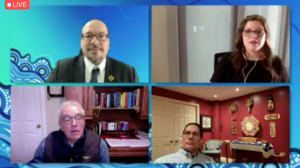‘Water is alive and provides life,’ says Anishinabek Nation Chief Water Commissioner during annual Water Symposium

By Rick Garrick
OTTAWA — Anishinabek Nation Chief Water Commissioner Autumn Peltier stressed that no child should have to go without access to clean water during her Feb. 16 address at the virtual Assembly of First Nations (AFN) 5th Annual Water Symposium.
The Feb. 15-17 symposium also featured opening remarks by Ontario Regional Chief Glen Hare and a Panel Presentation on the Class Action Litigation on Drinking Water Advisories in First Nations that included Curve Lake Chief Emily Whetung.
“Water is alive and provides life,” Peltier says. “To this day, there is no body of water in Canada that I would drink freely from — there are so many contaminants.”
Peltier says there are 161 long-term and short-term drinking water advisories across Canada as of February 2022.
“There are 103 long-term advisories, Ontario alone has 62 of those,” Peltier says. “There are 58 short-term and 19 of those are in Ontario.”
Peltier says she delivered her first speech on the sacredness of water when she was eight years old.
“Now I’m 17 and I think that for half my life to date, I’ve been advocating for clean water for my people,” Peltier says. “Today, my people still don’t have clean water, there are still existing boil water advisories right now. What I’m trying to say is I don’t want to still be saying keynotes and doing all this work when I’m 70-years-old. What I have been saying is we need to do this today, not wait another five to 10 years to see change, we need to do it now.”
Peltier encourages youth to speak up and use their voices, noting that “the message is so much more stronger” when it comes from a young person.
“I like to say: ‘That’s when you know something is wrong because a child should not have to be speaking up about these types of issues,’” Peltier says. “So I strongly encourage young people and youth to speak up and use their voices.”
Ontario Regional Chief Hare adds that he is also “extremely concerned” about the state of water for First Nations across the country and especially in the Ontario region.
“As I sit here and share these words with all of us here, at the same time I am thinking of our political friends that visit our communities who will not drink our water when they come to visit us but we have to or who will not wash in the water but we have to,” Ontario Regional Chief Hare says. “That’s what is going through my mind as we are doing this work here today. First Nations continue to face acute unsafe drinking water issues that are particularly important in light of the impacts of the COVID-19 pandemic which has highlighted the uncertainty that First Nations continue to face with respect to water. It is clear that the access to water and sanitation is a human right that too many First Nations do not have compared to most Canadians.”
Chief Whetung says the settlement agreement for the Class Action Litigation, which was led by Curve Lake, Tataskweyak Cree Nation, and Neskantaga, includes individual compensation and community compensation for past harms and go-forward commitments to ensure the communities get access to clean drinking water.
“There’s 259 communities in Canada that had long-term drinking water advisories that lasted more than a year since 1995,” Chief Whetung says during the panel presentation. “Any status Indian who was ordinarily resident on a reserve for at least one year, it doesn’t have to be their own Band, during a long-term water advisory that lasted more than a year is eligible for that individual compensation. It’s to compensate for having lived through the hardships [during] that long-term water advisory.”
Chief Whetung says there will be a one-year claim period for people to submit a claim, with claims to be processed and paid out within 120 days of the claim period deadline.
“So we have one year from February 22 to file a claim,” Chief Whetung says. “Any individual who was ordinarily resident on a reserve during a long-term water advisory is automatically included in that Class [Action Litigation] — you don’t need to sign up but you do have to submit your claim.”
Chief Whetung says the 259 communities need to reach out to the legal team at Olthuis Kleer Townshend LLP or McCarthy Tétrault LLP and pass a Band Council resolution in order to sign up for the Class Action Litigation.
“The base compensation for communities that have had a long-term water advisory that lasts more than a year is $500,000 automatically,” Chief Whetung says. “You get that base compensation for loss of economic opportunity and loss of ability to practice your culture in the community. There is additional compensation for communities on top of that equivalent to half of the compensation that is paid out to [citizens] in your community, which can add up to a significant amount that will allow your community to start repairing some of the economic losses or to start being able to practice those cultural pieces that have been missing for so long.”
Chief Whetung says the actual costs of construction and maintenance of water treatment plants will also be covered under the settlement agreement.


